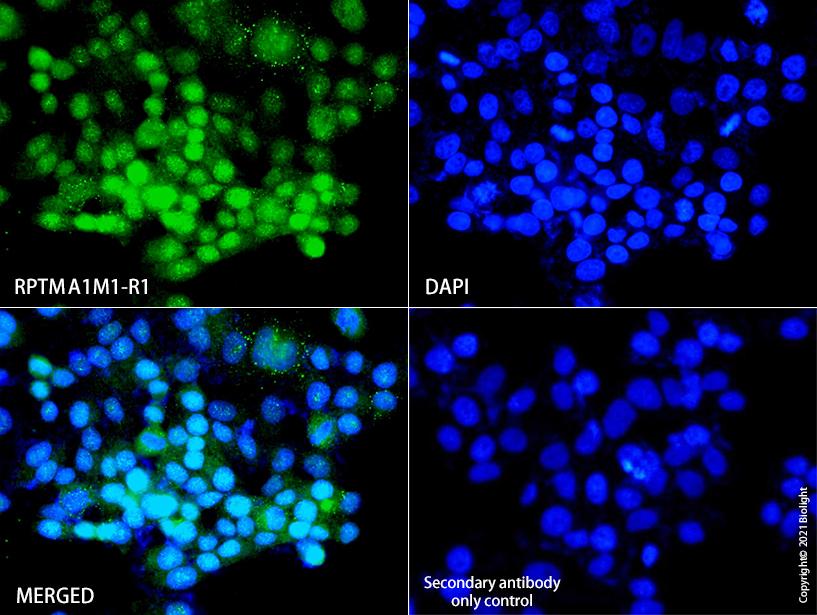
产品名称:Anti-Ubiquitin Antibody, Recombinant Antibody, R1
克隆号:/
抗体亚型:/
经验证的应用:WB/IHC
交叉反应:all
特异性:Detect ubiquitin, polyubiquitin and ubiquitin protein and recombinant NEDD8
免疫原:Recombinant full length protein corresponding to Bovine Ubiquitin
制备方法:/
来源:Recombinant Mouse IgG
纯化:Protein A purified
缓冲液:Supplied in PBS, 50% glycerol and less than 0.02% sodium azide, PH7.4
偶联物:Unconjugated
状态:Liquid
运输方式:This antibody is shipped as liquid solution at ambient temperature. Upon receipt, store it immediately at the temperature recommended.
储存条件:This antibody can be stored at 2℃-8℃ for one month without detectable loss of activity. Antibody products are stable for twelve months from date of receipt when stored at -20℃ to -80℃. Preservative-Free. Avoid repeated freeze-thaw cycles.
图片:
Figure1.Western blot analysis of 293T, HeLa and HepG2 cells, untreated or treated with the MG132 (50 µM, 90 minutes), using RPTMA1M1-R1 at 2ug/ml dilution. Secondary antibody: HRP Goat Anti-Mouse IgG (H+L) at 1:5000 dilution. Blocking buffer: 5% nonfat dry milk in TBST. Detection: ECL Basic Kit . Loading control to GAPDH (CP00002HuA10).
Figure2.Immunofluorescent analysis of Hela cells , using RPTMA1M1-R1 (green) at 10ug/ml dilution. Nuclear DNA was labelled in blue with DAPI (blue).
别称:/
背景信息:Ubiquitin is a conserved polypeptide unit that plays an important role in the ubiquitin-proteasome pathway. Ubiquitin can be covalently linked to many cellular proteins by the ubiquitination process, which targets proteins for degradation by the 26S proteasome. Three components are involved in the target protein-ubiquitin conjugation process. Ubiquitin is first activated by forming a thiolester complex with the activation component E1; the activated ubiquitin is subsequently transferred to the ubiquitin-carrier protein E2, then from E2 to ubiquitin ligase E3 for final delivery to the epsilon-NH2 of the target protein lysine residue. The ubiquitin-proteasome pathway has been implicated in a wide range of normal biological processes and in disease-related abnormalities. Several proteins such as IκB, p53, cdc25A, and Bcl-2 have been shown to be targets for the ubiquitin-proteasome process as part of regulation of cell cycle progression, differentiation, cell stress response, and apoptosis.
全称:/
克隆号:/
抗体亚型:/
经验证的应用:WB/IHC
交叉反应:all
特异性:Detect ubiquitin, polyubiquitin and ubiquitin protein and recombinant NEDD8
免疫原:Recombinant full length protein corresponding to Bovine Ubiquitin
制备方法:/
来源:Recombinant Mouse IgG
纯化:Protein A purified
缓冲液:Supplied in PBS, 50% glycerol and less than 0.02% sodium azide, PH7.4
偶联物:Unconjugated
状态:Liquid
运输方式:This antibody is shipped as liquid solution at ambient temperature. Upon receipt, store it immediately at the temperature recommended.
储存条件:This antibody can be stored at 2℃-8℃ for one month without detectable loss of activity. Antibody products are stable for twelve months from date of receipt when stored at -20℃ to -80℃. Preservative-Free. Avoid repeated freeze-thaw cycles.
图片:
Figure1.Western blot analysis of 293T, HeLa and HepG2 cells, untreated or treated with the MG132 (50 µM, 90 minutes), using RPTMA1M1-R1 at 2ug/ml dilution. Secondary antibody: HRP Goat Anti-Mouse IgG (H+L) at 1:5000 dilution. Blocking buffer: 5% nonfat dry milk in TBST. Detection: ECL Basic Kit . Loading control to GAPDH (CP00002HuA10).
Figure2.Immunofluorescent analysis of Hela cells , using RPTMA1M1-R1 (green) at 10ug/ml dilution. Nuclear DNA was labelled in blue with DAPI (blue).
背景信息:Ubiquitin is a conserved polypeptide unit that plays an important role in the ubiquitin-proteasome pathway. Ubiquitin can be covalently linked to many cellular proteins by the ubiquitination process, which targets proteins for degradation by the 26S proteasome. Three components are involved in the target protein-ubiquitin conjugation process. Ubiquitin is first activated by forming a thiolester complex with the activation component E1; the activated ubiquitin is subsequently transferred to the ubiquitin-carrier protein E2, then from E2 to ubiquitin ligase E3 for final delivery to the epsilon-NH2 of the target protein lysine residue. The ubiquitin-proteasome pathway has been implicated in a wide range of normal biological processes and in disease-related abnormalities. Several proteins such as IκB, p53, cdc25A, and Bcl-2 have been shown to be targets for the ubiquitin-proteasome process as part of regulation of cell cycle progression, differentiation, cell stress response, and apoptosis.
全称:/



